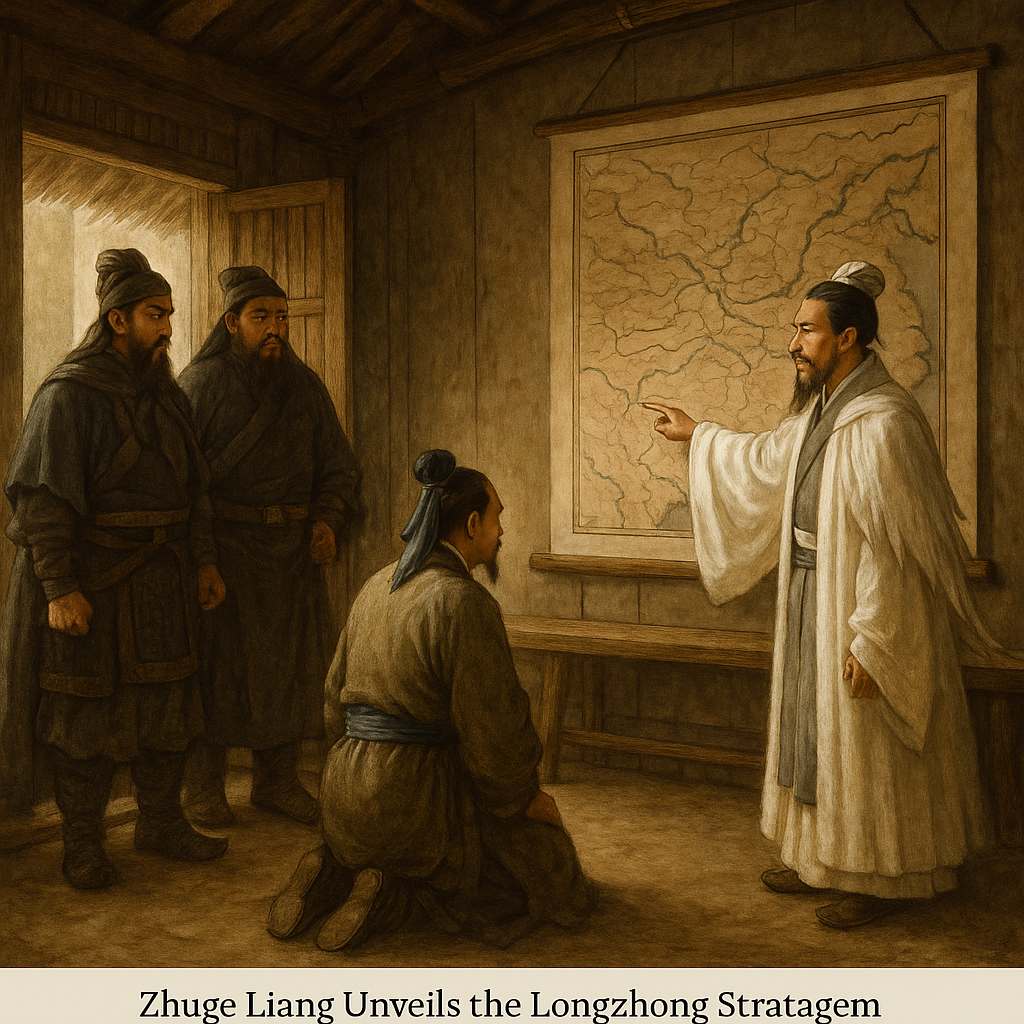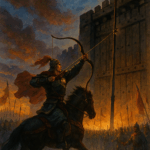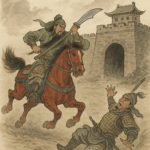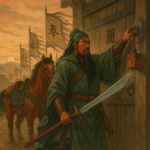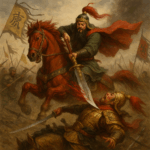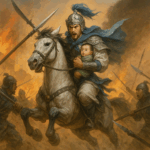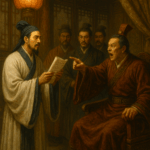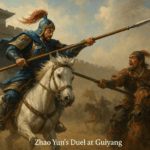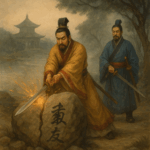It is told that Liu Bei’s two previous visits to Zhuge Liang went unanswered, and he resolved to try once more. Guan Yu said, “Big brother has twice gone in person to pay respects—surely that is too much. I suspect Zhuge Liang’s reputation exceeds his real ability, and so he avoids meeting us. Why do you persist in this folly?” Liu Bei replied, “No. In the past, Duke Huan of Qi sought out the recluse Dong Guo Yeren five times before gaining an audience. How much more should I, who seeks a truly worthy man?” Zhang Fei scoffed, “You’re wrong, brother. This country bumpkin is no great sage; if he won’t come to us, I’ll bind him with a hemp rope and drag him here!” Liu Bei rebuked him: “Have you never heard how King Wen of Zhou respectfully sought out Jiang Ziya? If even he showed such humility toward a sage, how can you be so discourteous? I shall go with Guan Yu; you must stay behind.” Zhang Fei protested, “If both of you go, how can I be left behind?” Liu Bei reassured him, “If you accompany us, you must be respectful.” Fei agreed.
So the three set out on horseback, accompanied by their retinue, toward Longzhong. Half a mile from Zhuge Liang’s cottage, Liu Bei dismounted and walked on foot, whereupon they met Zhuge Liang’s younger brother, Zhuge Jun. Liu Bei hurriedly saluted him and asked, “Is your brother at home?” Jun replied, “He only returned last night. Today he can receive you.” With that, he drifted away like a passing cloud. Liu Bei exclaimed, “Today fortune smiles upon us—we shall meet the Master!” Zhang Fei muttered, “What arrogance! He could have led us to the cottage, yet he vanished!” Liu Bei said, “Everyone has their duties; we cannot force him.”
The three approached the gate and knocked. A young servant opened it and inquired. Liu Bei instructed him, “Please inform your master that Liu Bei has come to pay his respects.” The boy replied, “Although Master is at home, he is taking an afternoon nap in the grass hall and has not awakened.” Liu Bei said, “Then do not disturb him.” He turned to Guan Yu and Zhang Fei, “Wait here.” With that, he alone entered the courtyard. Inside, he found Zhuge Liang lying on a simple mat, asleep on low benches. Liu Bei stood respectfully at the foot of the steps. After a long while, the Master showed no sign of stirring. Outside, Guan Yu and Zhang Fei waited impatiently; seeing no movement, Fei’s anger boiled over. “How rude this Master is!” he fumed. “He makes my brother stand at the steps while he lounges asleep! I’ll set the place alight and see how quickly he wakes!” Guan Yu restrained him. Meanwhile, Liu Bei calmly remained at the gate. Peering in, he saw the Master turn over and almost rise, but then sink back to sleep. A servant moved to call out, but Liu Bei waved him away and waited another hour before Zhuge Liang finally awoke, muttering a poem:
“Who wakes first from the grand dream?
In life, I alone am self-aware.
The grass hut’s spring slumber ample,
While daylight lingers beyond the window.”
When he finished, he turned and asked the page, “Has any visitor come?” The boy answered, “Lord Liu has been waiting here some time.” Rising, Zhuge Liang said, “Why was I not informed sooner? Allow me to dress.” He slipped into the back hall and, after a moment, appeared in full scholar’s robes.
Liu Bei saw that he stood eight feet tall, with a face like polished jade, wearing a silk headwrap and a white crane-feathered cloak that billowed around him—he looked every inch a divine immortal. Liu Bei bowed deeply: “I am but a humble scion of the Han, a simple farmer of Zhuo Commandery. Your great name has thundered across the land. I twice sought entry without success, and humbly entrusted my poor name upon this bench, uncertain if I’d ever be granted this honor.” Zhuge Liang replied, “A rustic of Nanyang, lazy by nature—I am ashamed to have kept you waiting.” After formal greetings, they sat apart as host and guest. When tea was served, Zhuge Liang said, “From your letters, I see your deep concern for the people and the realm; but I am young and my talents shallow, unworthy of such lofty discourse.” Liu Bei responded, “The words of Sima De and Xu Yuanzhi are no idle talk. I beg you not to spurn this unworthy man, but to enlighten me.” Zhuge Liang demurred: “De Cao and Yuan Zhi are men of lofty rank; I am but a tiller of fields—how dare I speak of ruling the world? They have erred in naming me so.” Liu Bei said, “A great man’s talents should not lie idle in the wilderness. I beseech you, for the sake of all under Heaven, to open your heart to this foolish man.” Smiling, the Master replied, “Tell me your ambitions.” Liu Bei cleared the servants aside and confided: “The Han has fallen; treacherous ministers run unchecked. I lack the strength to uphold righteousness across the land. Yet if you would open my mind and rescue me from despair, it would be the greatest blessing.”
Zhuge Liang said, “Since Dong Zhuo’s rebellion, heroes have arisen everywhere. Cao Cao, though inferior in prestige to Yuan Shao, triumphed over him—not by fate alone, but by strategy. Now he holds a million troops and commands the Emperor himself. He cannot be opposed directly. Sun Quan, ruling Jiangdong for three generations, sits on a natural fortress with loyal people—he may be an ally, not a target. Jing Province, bounded by the Han and Mian rivers, with access to the South Sea, adjacent to Wu in the east and connected to Bashu in the west, is a strategic fulcrum that only its rightful lord can defend—it may someday serve you. Yizhou, with its fertile lands and mountains as ramparts, was the foundation on which Gaozu built his empire. Liu Zhang there is weak, his people prosperous but forgotten, and true talents yearn for a wise lord. You, heir of the Han, renowned for your faith and righteousness, could embrace heroes and crave the wise as thirst longs for water. If you hold Jing and Yizhou, secure those natural barriers, win over minority tribes in the south and west, ally with Sun Quan in the east, and reform governance at home, then when turmoil arises elsewhere, you could send troops from Jing to attack Wan and Luo, and lead Yizhou’s forces through Qinchuan. Would not the people, hopeful for relief, welcome you with food and drink? If such designs succeed, your great cause can prosper and the Han restored.” He swept aside the screen, unveiling a large map of the fifty-four commanderies of Sichuan and pointed: “Here is the land. First secure Jing, then seize Yizhou to establish your foundation, forming a tripod of power before you turn to the Central Plains.” Liu Bei bowed in thanks: “Your words have lifted the fog from my mind and revealed the clear sky. Yet Liu Biao in Jing and Liu Zhang in Yizhou are both kin of the Han—how can I displace them?” Zhuge Liang smiled, “I have studied the stars: Liu Biao will soon pass from this world, and Liu Zhang lacks the virtue to rule—both will, in time, come to you.” Overwhelmed, Liu Bei knelt and offered profound thanks. With those words, before even emerging from his straw hut, Zhuge Liang had grasped the trisection of the realm—a marvel unmatched in ten thousand years. Later poets praised:
“In troubled Yuzhou he sighed alone,
Fortune smiled in Nanyang’s crouching dragon!
To know where the scales would one day balance,
The Master smiled and pointed to the map.”
Liu Bei entreated, “Though my name is humble and my virtue scant, I beg you not to spurn me, but to leave your cottage and aid me.” Zhuge Liang wept, “I have long loved tilling the fields and am loath to serve in the world.” Liu Bei cried, “If you will not emerge, what of the people?” Tears soaking his robe, he fell silent. Seeing such sincerity, the Master declared, “Since you will not abandon me, I pledge my humble service.” Overjoyed, Liu Bei invited Guan Yu and Zhang Fei inside; they offered gold and hemp as tokens, which Zhuge Liang at first refused, but then accepted as a symbol of Liu Bei’s heartfelt intent. They lodged together that night.
The next day, Zhuge Jun returned. Zhuge Liang said, “Bound by the debt of Liu Bei’s three visits, I cannot refuse. You, brother, must tend the fields here and let no blade of grass go to waste. When I have succeeded, I shall return once more to retire.” Later poets lamented:
“My spirit soared yet pondered retirement,
My duty done, I would recall these words.
Because the Lord insisted I emerge,
Under autumn winds at Five-Length Plain.”
Another ancient verse proclaimed:
“Imperial hands once bore the sword of snow,
By Mangdang’s blood-white serpent it ran.
For two hundred years the realm lay sundered,
From Luoyang’s fall to Huan and Ling’s decay.
Xian Emperor moved west to Chang’an,
Heroes rose in every corner of the land.
Cao Cao seized heaven’s favor in Hebei,
Sun clan’s legacy soared in Jiangdong.
Poor Liu Bei wandered ‘neath his banner,
In lonely Xinye lamenting the people’s plight.
Nanyang’s Recluse harbored great ambition,
His mighty force would split the realm’s divide.
It was Xu Shu’s parting counsel that bound,
Three visits revealed the heart of the hidden dragon.
At thirty-nine he left plow and pen,
First Jing, then Shu—heaven’s hand envisioned it.
Words like thunder summoned the storm,
His laughter and counsel changed fate’s loom.
With dragon’s might and tiger’s glance he secured the world,
His name endures through endless ages.”
Liu Bei and his companions bid farewell to Zhuge Jun and returned together to Xinye. Liu Bei treated Zhuge Liang as his teacher, sharing his meals and bed, and discussing statecraft day and night. Zhuge Liang warned, “Cao Cao is building the Black Tortoise Pool in Jizhou to train his river fleet—he surely intends to invade the south. You should secretly send scouts across the river to learn his true designs.” Liu Bei agreed and dispatched envoys eastward.
Now, since Sun Ce’s death, Sun Quan had firmly established himself in Jiangdong, continuing his father and brother’s legacy. He welcomed scholars at Wuchang, among them Gu Yong (courtesy name Derun), Zhang Hong (Mancai), Xun Zheng (Wenjing), Cheng Bing (Deshu), Zhu Huan (Xiushu), Lu Ji (Gongji), Zhang Wen (Xiushe), Luo Tong (Gongxu), and Wu Can (Kongxiu). Local chieftains like Lü Meng (Ziming), Lu Xun (Boye), Xu Sheng (Wenxiang), Pan Zhang (Wengui), and Ding Feng (Chengyuan) also swore allegiance. Together they bolstered Sun Quan’s court.
In the seventh year of Jian’an, after Cao Cao defeated Yuan Shao, he sent envoys eastward demanding that Sun Quan send his son as a hostage to Chang’an. Lady Wu, Sun Quan’s mother, called a council, and Zhang Zhao warned that conceding to Cao Cao’s demands would place them under his control. Zhou Yu concurred, “We need not send our heir; better to resist and watch for changes.” Sun Quan followed their advice, refused the envoy, and thus foiled Cao Cao’s scheme.
In November of the eighth year, Sun Quan attacked Huang Zu and routed him in the middle of the river. Ling Cao, leading the vanguard on a light boat, charged at the enemy and was felled by an arrow from Huang Zu’s general, Gan Ning. Ling Tong, Ling Cao’s son aged only fifteen, recovered his father’s body with great courage and brought it back. Seeing the tide turn against him, Sun Quan retreated to Wu and lamented the loss.
Meanwhile, Sun Quan’s younger brother, Sun Yi, Governor of Danyang, was arrogant and fond of drink, often whipping his soldiers while drunk. His commander, Gu Lan, and the county assistant magistrate Dai Yuan, conspired to kill him. They struck at a banquet, but Sun Yi’s wife, Lady Xu—skilled in the I Ching—divined great misfortune in the omens and warned him not to attend. He disregarded her and was slain.
Lady Xu secretly summoned Sun Yi’s faithful guards, Sun Gao and Fu Ying, weeping: “My lord mourned justice; these two villains murdered him and framed another. They now seek to seize my person. I feigned compliance to preserve my household, but we must avenge him and purge the traitors!” Sun Gao and Fu Ying pledged to uphold her will. At the end of the mourning period, Lady Xu shed her widow’s garb, perfumed herself, and invited Gu Lan to a private ceremony. Intoxicated, he followed her into a secluded chamber, where Sun Gao and Fu Ying sprang forth and slew him. Next they lured Dai Yuan under the pretense of another feast and dispatched him likewise. They then executed the ringleaders among their families. When Sun Quan arrived in Danyang and learned of their deed, he was astonished. Recognizing their loyalty, he enfeoffed Sun Gao and Fu Ying as palace guards and ordered them to protect Lady Xu, sending her home safely. All in Jiangdong praised her righteousness.
Elsewhere, the Wu generals suppressed bandits across the region. With over seven thousand warships, Sun Quan appointed Zhou Yu Grand Commander of army and navy. In the twelfth winter’s October, Lady Wu fell gravely ill. She summoned Zhou Yu and Zhang Zhao, urging them to support Sun Quan as they would a teacher: “I once dreamed the moon came to my embrace when my first son, Ce, was born, and the sun when my second son, Quan, was born—omens of great fortune. Alas, Ce died young. I now entrust Jiangdong to Quan. Aid him with one heart, and my name shall never perish.” After she passed away, Sun Quan mourned with full rites but did not dwell on his grief.
The following spring, Sun Quan debated launching a campaign against Huang Zu. Zhang Zhao protested that his mourning was not yet complete; Zhou Yu retorted, “Should we wait for a year to avenge our blood?” Before they could decide, Lü Meng reported that Gan Ning had defected to Wu and offered his sword—his prowess and knowledge of books impressed Sun Quan, who welcomed him warmly. Gan Ning advised that Huang Zu be struck swiftly, as his cruelty and neglect alienated the people and left his forces undisciplined. Sun Quan proclaimed, “Such counsel is pure gold!” and appointed Zhou Yu Grand Commander, Lü Meng vanguard, Dong Xi and Gan Ning deputy generals, and led a force of a hundred thousand to attack Yellow Ancestor at Xiakou.
Scouts reported to Sun Quan that Huang Zu fortified Jiangxia with Su Fei, Chen Jiu, and Deng Long commanding the vanguard, chaining warships across the river’s mouth bristling with crossbows. The Wu fleet faltered before this barricade, but Gan Ning selected over a hundred swift boats with fifty elite marines each. They rowed close, cut the chains, and boarded the enemy ships. Gan Ning himself slew Deng Long. Seeing the breakthrough, Lü Meng leapt ashore, set fire to the fleet, and in single combat felled Chen Jiu. When Su Fei’s troops came to aid, Wu forces swarmed ashore and decisively routed them. Su Fei fled, only to be captured by Pan Zhang and brought before Sun Quan, who imprisoned him pending Huang Zu’s defeat. The armies pressed on day and night, attacking Xiakou without cease. As the old saying goes:
“Because you spurned the bandit of brocade sails,
You forced them to break the river’s chain.”
What fate befell Huang Zu remains to be told in the next chapter.
